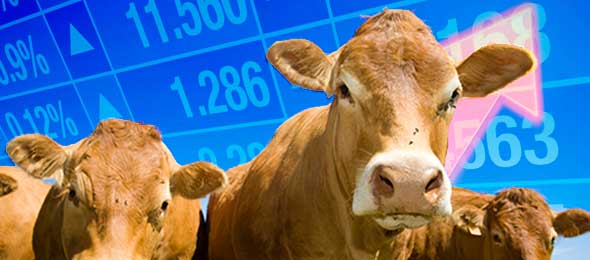CME hog, cattle futures sag as broad selling hits markets

Chicago Mercantile Exchange livestock futures slumped on Monday as traders reduced risk in the face of rising coronavirus cases
Selling hit a range of markets including crude oil, which lost more than 3%, and U.S. stocks.
“The risk-off trade is back today,” said Dan Norcini, an independent livestock trader.
Most-active February hog futures settled down 1.325 cents at 79.475 cents per pound, while April hogs ended down 1.275 cents at 83.500 cents.
“Authorities reported a case of atypical bovine spongiform encephalopathy (BSE) in an 8-1/2-year-old beef cow in Alberta“
Traders are waiting for the U.S. Department of Agriculture to issue a quarterly Hogs and Pigs report and monthly Cattle on Feed report on Dec. 23.
The USDA quoted the U.S. pork cutout at $86.49 per hundredweight (cwt), up $0.67 from Friday.
In the beef markets, CME February live cattle futures settled down 0.450 cent at 135.975 cents per pound. CME March feeder cattle fell 1.200 cents to 160.500 cents.
Wholesale boxed beef prices were mixed, with choice cuts down $0.63 at $262.38 per cwt and select cuts up $2.39 at $250.67, according to the USDA.
Analysts said there were some concerns that U.S. cattle would be affected by a freakish storm that brought “Dust Bowl” conditions and gusts of more than 100 mph (161 kph) to parts of Plains last week, reminiscent of the U.S. drought years of the 1930s. read more
In Canada, authorities reported a case of atypical bovine spongiform encephalopathy (BSE) in an 8-1/2-year-old beef cow in the province of Alberta, the World Organisation for Animal Health (OIE) said.
The carcass did not enter the human food or animal feed chains, the Paris-based OIE said, citing a report from the Canadian authorities. An outbreak of BSE, more commonly known as mad cow disease, badly hit Canadian exports around 20 years ago.











